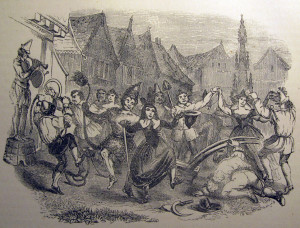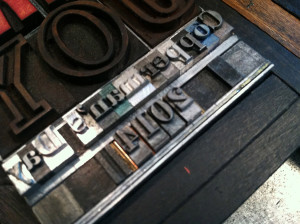With the Christmas season’s end last week, the women had their “official” and traditional Back to Work day last Wednesday, on the 7th of January, with St. Distaff’s Day. But tomorrow, the first Monday after Epiphany, it’s time for the men to have their own version of this. It’s Plough Monday, and there may be some ceremonial ploughing of the frozen ground on this day, but mostly it is the last of the Christmas ceremonies in this period of shifting out of Christmastide and into ordinary time.
Of course today we welcome a more egalitarian approach: why shouldn’t the men be at the spindle and distaff, if they so wish, and the women at the plough? Nonetheless, these are traditions that come out of a time of more traditional division of labor between the sexes, and we heartily encourage you to mix things up to your liking. Our goal, simply, is to help you be aware of days worth celebrating, of course.
And so on Plough Monday it would be not at all unusual to see a gaggle of men parading through the village with a plough, finely decorated. The men themselves would be finely decorated, too, in all manner of foolish costumes, hearkening the Feast of Fools aspect of the Twelve Days of Christmas that have just passed. One man will be dressed as the Bessy, an old woman, and whether he realizes it or not, she is the personification of the old hag of winter or the goddess in her crone stage. And the ploughmen may perform an old mummers play, filled with images of death and rebirth. Soon, of course, winter will pass and it will be time to plough the earth in earnest and these things all relate to each other. With the spring, the young goddess will be born again. Though all seems cold now, and dead, life will return.
There will be mysterious old dances and a good deal of noise in the banging of drums and the blowing of horns, and there will most likely be a collection box passed around to help pay for the sport (as well as a few rounds at the tavern).
A lesser known celebration on this same day is Copperman’s Day, particular to Holland, and known especially in the print trade. And since Convivio Bookworks is a place that is a printshop at heart, it is a day we hold in high esteem. On the first Monday after Epiphany each year, print apprentices would be given the day off to work on their own projects, which they would later sell for a copper.
Last year, we printed an inaugural Convivio Bookworks Copperman’s Day print, and we’re planning one for this year, too. This year’s is a continuation of last year’s theme, inspired by a Christmas Revels reading first penned by Fra Giovanni Giocondo. It is said to have been written on Christmas Eve, 1513, and in his letter, Fra Giovanni encourages us to take heaven, to take peace, and to take joy. Because when you get right down to it, life deals us what it will and it is up to each of us to decide how we respond. Even in times of darkness, we can choose to take joy, and so last year’s print was just that message: Take Joy. This year, we’re working on Take Peace. I’m working in historic wood type, though, and so far I’m having a devil of a time finding the two Es I need to spell “peace,” at least if I want to stick to my original design plan. On top of that, I do not have the day off from work tomorrow, as the old Dutch coppermen of yore did on the Monday after Epiphany.
So be patient, our annual Copperman’s Day print may take a few extra days this year. Be that as it may, we do encourage other letterpress printers around the globe to take part in this old tradition that we see fit for revival. It’s all about loving what you do, and sharing it with others. It’s all about taking joy.
Image: Procession of the Plough on Plough Monday, an engraving from The Book of Days: A Miscellany of Popular Antiquities by the Chambers Bros., Edinburgh, 1869.

